 By Jeannie Briones
By Jeannie Briones
TULALIP, Washington- On November 16th, Tribal member Victor Moses is preparing his boat at the Tulalip Marina to ship out and catch Dungeness crab and chum fish.
syəcəb
 By Jeannie Briones
By Jeannie Briones
TULALIP, Washington- On November 16th, Tribal member Victor Moses is preparing his boat at the Tulalip Marina to ship out and catch Dungeness crab and chum fish.
Article and photo by Jeannie Briones
TULALIP, Washington- Mentoring another person is one of the greatest gifts you could give them; there’s almost no better feeling in the world than to help another person accomplish their dreams. And to a child, having another caring adult in his or her life, someone who believes in them and supports them, can be life changing.
In recognizing the importance of mentoring in a child’s life, staff at Tulalip Tribes Youth Services is working to implement the 7th Generations Mentor Program, a program specifically designed for Native American youth and open to Tulalip tribal members age 10-17. And equally as impressive, out of 565 federally-recognized tribes in the United States, the Tulalip Tribes was chosen by the Office of Juvenile Justice Delinquency Prevention to be one of ten recipients of the 7th Generation Mentoring Grant, which is instrumental in funding this project.
“The goal of this program is to reach out to Native American youths and guide them towards healthy lifestyle choices and to build lasting relationships between tribal youth and caring adult mentors, through group and cultural activities and on-on-one mentoring,” said Saundra Wagner, Tribal Mentoring Specialist.
Youth Service’s staff is asking for volunteers, age 18 and above, from the community to serve as mentors. These mentors are required to have a current driver’s license and a background check will be done on each individual. Mentors will also participate in a two-hour training, designed for learning about relationship building. Mentors will learn how to build confidence in Native youth through affirmation of their skills and values and to help youth understand the tribal history, culture, and value systems that have guided their people for generations.
A good mentor–mentee relationship takes time to develop, and volunteers are asked to spend at least one hour a day, twice a month, with the youth. Mentors and kids will take part in fun activities like going to the movies, shooting hoops or just hanging out and talking, and to promote Native culture, workshops such as drum making will be available. Monthly meetings with staff, mentors and mentees will be held to discuss progress, future development and weekly activity suggestions, to help sustain and strengthen mutual mentoring relationships
“Research and evidence shows that developing a strong sense of cultural identity and pride for their heritage can motivate tribal youth to make positive life choices. Our goal is to enhance the cultural identities of our tribal youth in hopes for reducing risky behaviors,” said Saundra.
Still in the early stages of the mentor program, staff is working to fill their calendars with fun, educational and cultural workshops and outings for the youth, and is open to suggestions from parents and the community.
If you are interested in becoming a mentor or if you know of a young person that might benefit from this program, contact Saundra at Saundra.wagner@tulaliptribes-nsn.gov.
“I am really excited to have the opportunity to get this program going; to see a child’s confidence and behavior change because they have a bigger sense of belonging. These youths are our future as tribal leaders, mentors, and positive members of our community,” said Saundra.
Jeannie Briones: 360-716-4188; jbriones@tulaliptribes-nsn.gov
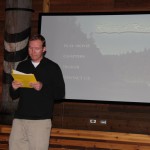
Maintain a healthy lifestyle and academic achievement with the Student Wellness and Cultural Awareness Club
Article and photo Jeannie Briones
TULALIP, Washington- Students and staff at Northwest Indian College (NWIC) Tulalip site are working to raise awareness about healthy living and cultural significance. A goal that led to the formation of the Student Wellness and Cultural Awareness Club (SWCA), which is essentially a support group open to all enrolled students of NWIC.
Members of SWCA believe that by educating fellow students and community members about the benefits of a nutritious diet, paired with keeping in tune with the Native American culture and current issues that Native Americans are facing, will benefit not only their physical and spiritual well-being, but will help in decision making about the impacts they have on the environment.
Though newly formed, the club has already shown steady progress in their endeavor. Students have planted and cultivated a garden at the NWIC Tulalip site, and plan to share the harvest of carrots, onions, sage, corn, tomatoes, peppers, and peas with the community. Encouraging attendance at the Tulalip Health Fair so students can learn the importance of maintaining routine health care check-ups is also on the agenda, as well as participating in cultural events around Tulalip. Drum making and other culturally relevant workshops are in the planning.
Club members are also reaching out to high school students, teaching the importance of a good education and attending college, while working to ensure that their own fellow students are getting the educational support they need.
“The main objective of SWCA is to provide students a safe environment and opportunity to learn and be able to practice their culture and instill in them it’s okay. We want to make sure that if they need help with homework that there’s a group of people they can go to make sure they get it done,” said Stephanie Spiering, student at the NIC Tulalip site.
Club members are asked to research films that focus on Native American political or environmental issues and share them with the community. On November 13th, members of SWCA presented a documentary film, “River of Renewal” at theTulalip Hibulb Cultural Center.
This film examines the water and wildlife crisis in the Klamath Basin, how the communities that harvest food from the basin suffered due to a lack of water to serve the needs of irrigation and fisheries alike, and how local tribes and community members came to a common ground, recognizing that economic revival could occur only if ecological vitality were restored. How leaders from different communities can work together to seek to seek a way beyond economic stagnation, and environmental disaster is the lesson that SWCA members wanted to share with the public.
“The film represents collaboration between stake holders to solve environmental conflicts and that gives us hope for the future with limited resources to work together and make sure that salmon, water, and other natural resources are shared and that tribal fishing rights are recognized, so we have enough resources for not only for tribes, but also to commercial fisherman, and farmers” said Ben Lubber, faculty instructor for Northwest Indian College and Faculty advisor for the Student Wellness and Cultural Awareness Club.
The HibulbCultureCenterwill be showing the film choices of SWCA quarterly. Please visit http://www.hibulbculturalcenter.org/ for a schedule of events. Visit www.riverofrenewal.org for more information on the “River ofRenewal” documentary.
SWCA also hosts an open mic night, held at the Tulalip Administration Building every second Friday of the month, from 7:00-9:00 p.m. Community members are invited to share in an evening of poetry, singing and comedy.
SWCA is non-profit organization accepting donations for plants, supplies for cultural projects, film events, and school supplies and all enrolled students at NWIC are encouraged to join in on the club’s bi-monthly meetings held at the Tulalip site at 1:00 p.m. For information on the Student Wellness and Cultural Awareness Club or to make a donation, contact Ben Lubbers at 425-870-0379 or visit www.nwic.edu/tulalip. The Northwest Indian College Tulalip site is located at7707 36th Ave NW,Tulalip,WA98271 .
Jeannie Briones: 360-716-4188; jbriones@tulaliptribes-nsn.gov

Article and photo by Jeannie Briones
TULALIP, Washington- Tulalip Hibulb Cultural Center has partnered with Seattle’s Burke Museum. Salish Bounty: Traditional Native American Foods of Puget Sound exhibit is available until January 2013.
The Salish Bounty exhibit connects archaeological and historical research about thousands of years of food traditions in the Puget Sound area to current efforts to revitalize these food traditions in the region. On display at the exhibit are ancient fishing, hunting and cooking devices, historic photos and maps, actual food ingredients and videos of Coast Salish people talking about food.
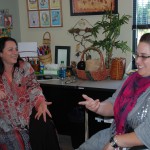 Article and photo by Jeannie Briones
Article and photo by Jeannie Briones
TULALIP, Washington- We live in a fast paced world that is growing by the minute. Our environment is hectic and stressful at times, which can make it overwhelming to manage a harmonious life. The increased pressure of balancing a career, family and other factors are burdensome and when life throws unexpected events, like a death in a family, it builds more pressure, making it harder to properly deal with grief and loss.
There are counselors available through the Employee Assistance Program (EAP) at the Tulalip Administration Building to all Tulalip Tribal Government employees that are having issues and need guidance.
“The primary goal and objective for EAP is to help employees resolve personal or work related problems. The goal of the EAP is to help employees with a wide range of issues that could be anything from depression, stress, anxiety, addictions, anger, marital or relationship issues, parenting issues, grief or loss, or coping with change during different life transitions,” said Lisa Kibbee-Hacker, EAP Manager.
EAP is a customized help based on the employees’ individual needs. Employees can take advantage of workshop classes that cover subjects such as effective communication skills, addressing workplace bullying, and group-managing grief and loss in the workplace. Another component to this program is that staff provides support to managers and supervisros, and facilitates mediation meetings between the employee and manager.
“If employees are having work issues, we provide referrals if there is nothing we can do,” said Jessica Talevich, EAP Counselor. “I am an art therapist. Art therapy oriented EAP is a pretty unique thing. EAP professionals who use art-making as a component in their counseling are pretty rare.”
Overall EAP is beneficial for mental health and well-being. EAP professionals provide individual assessment to work on short term problem-solving goals.
“We give them the tools to have self-empowerment and to make change,” said Lisa.
Lisa believes EAP is effective in helping people and enjoys seeing employees have a much more positive outlook.
“You see the transition from the beginning and to the final sessions; this is why we do this work,” said Lisa.
This service is at no cost to employees. Contact EAP counselor Jessica Talevich at 360-716-4488 or email jtalevich@tulaliptribes-nsn.gov, if you are interested in setting up an appointment. If you are interested in up-coming workshops, contact EAP Manager, Lisa Kibbee-Hacker at 360-716-4150 or email lisak@tulalipresort.com.
Jeannie Briones: 360-716-4188; jbriones@tulaliptribes-nsn.gov
Article by Jeannie Briones
TULALIP, Washington- Have you received your flu shot this year? Everyone should get a flu shot, especially Tulalip Tribal employees working around children, elders or in highly populated work environments. Flu shots reduce the chances of getting sick and spreading the flu to others.
Flu shots are free to all Tulalip Tribal members and employees at the Tulalip Clinical Pharmacy or Tulalip Karen I Fryberg Health Clinic through February 2013. The shot is administrated two ways, by injection or a new nasal spray alternative called FluMist.
The Tulalip Clinic accepts walk-ins, and flu shots are available Monday, Tuesday, Thursday and Friday from 9:00 a.m. to 11:30 a.m. and Wednesday from 10:00 a.m. to 4:00 p.m. The Pharmacy has flu shots available all hours, Monday, Tuesday, Wednesday and Friday 9:00 a.m. to 6:00 p.m. and Thursdays, 10:00 a.m. to 6:00 p.m., and Saturdays noon-4:00 p.m.
For more information contact a representative at the Tulalip Clinical Pharmacy at 360-716-2660 or visit www.tulalipclinicalpharmacy.com or contact the Tulalip Karen I Fryberg Health Clinic at 360-716-4511.

Article and photo by Jeannie Briones
TULALIP, Washington- Tribal member Marissa Joseph plays a tune at the Tulalip Boys and Girls Club during the unveiling of a New Immersion and Tech Center on November 7th. The Immersion Center includes a program room, a music and a recording room, and the immersion room. With this new technology, kids learns are developing new skills and expanding their minds. For more information about the Tulalip Boys & Girls Club new Immersion Center visit www.bgclub.tulalipbribes-nsn.gov
Jeannie Briones: 360-716-4188; jbriones@tulalipbriones@tulalipbribes-nsn.gov
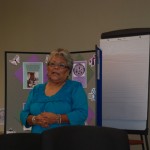
Article and photo Jeannie Briones
TULALIP, Washington- “One out of three native women will be sexually assaulted in their lifetime,” said Cheryl Neskahi Coan, Senior Residential Aide for the Tulalip Legacy of Healing Advocacy Center and Safe House.
Staff at Tulalip Legacy of HealingAdvocacyCenterand Safe House is working to educate the community about domestic violence and put an end to the cycle of abuse. “ “In Her Shoes ~ Native Version”, is an interactive workshop designed to help people understand what victims face in every day life, and opened to the community on October 30th. This Native version workshop held at the Tulalip Administration Building, focused on acts of abuse based on real-life stories of Native American women. This workshop builds off of the “In Her Shoes, Economic Justice Edition” workshop offered on October 18th at Tulalip.
“I really enjoyed the workshop,” said tribal member Charlotte Jones. “It allows people to really see what it’s like to be in that situation. I think that being able to literally walk in their shoes and make decisions that they would face will allow people to have a little more insight and compassion to victims and also for the perpetrators. It’s hard to be a victim, but on the other side, we need to help the perpetrators, to make sure that they don’t victimize further.”
In cases of domestic violence against Native women is committed by non-native perpetrators are usually not prosecuted due to jurisdictional limits in tribal courts and this can lead to reoccurring abuse. Non-natives committing acts of domestic violence against Native American victims are not being held accountable for their actions.
“In Her Shoes ~ Native Version”, explores the real life experiences of Native women in various situations such as, in a same gender relationship, with a disabled partner, in a traditional marriage, and as a career woman. The workshop also addresses the victim’s issues of intimidation, coercion, power, and the control that the perpetrator uses over the victim.
Workshop facilitators also use a series of visual aids called the Native Maze Map: Navigating Systemic Response to Battering. Flow charts show how complex domestic violence is.
“We came together to bring our tribal community together. Our wish is to have community members understand what domestic violence and sexual assault is. There is so much of that happening within our tribal community and throughout all of Indian country. It’s an issue that all tribal communities need to address,” said Cheryl.
After the workshop, participants discussed their overall perception of the victims and the perpetrators and what the participants gained.
“I think this program is a great opportunity for not only women, but men to be more involved,” said tribal member Melissa Cavender. She followed up by saying it’s important to educate the youth about the issues and prevention.
For more information, call the Tulalip Legacy ofHealingAdvocacyCenterand Safe House at 360-716-4100, Monday through Friday, 8:00 a.m. – 4:30 p.m. In case of after hours emergencies, call the Domestic Violence Services of Snohomish County 24-hotline at 425-252-2873 or for immediate help, call the Tulalip Tribal Police at 360-716-4608. For information about “In Her Shoes ~ Native Version” created by “Mending the Scared Hoop” visit www.mshoop.org
nie Briones: 360-716-4188; jbriones@tulaliptribes-nsn.gov
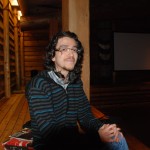
Article and photo by Jeannie Briones
TULALIP, Washington- Tribal member Derek C. Jones is a filmmaker, musician, and programmer with over twenty short films to his credit at the young age of twenty-four. He continues to pursue his vision and passion to help people understand each other by breaking down barriers and stereotypes through his film work.
On October 25th, Derek showcased five short films at the Tulalip Hibulb Cultural Center Film Series. “Raising Our Arms in Thanksgiving,” “Puppet Reporters,” “Who Am I,” and “Happiness” are early works that were co-directed with his younger brother, Aaron. Derek also presented a short storytelling film about Coast Salish history and art. This video is shown to third and fourth graders at theMuseum ofHistory and Industry.
“I really want to provide positive images of indigenous Native Americans and the beauty of our culture,” said Derek. “A large part of my artistic inspiration is drawing out small details and interactions that people have with each other and with nature and placing those interactions into a larger context,” said Derek.
A large part of his film storytelling is a reflection of his life. Derek is in the creative stages of writing and creating new material. He plans to travel and experience life and expand his knowledge to help build his craft in filmmaking.
“A lot of projects I’m working on are related to race, gender, and sexuality,” said Derek. “One topic that resonates strongly is gender, because when you look at a lot of the media today, it’s skewed towards the male perspective. We have Hollywood films with only one out of three speaking roles for women.”
“Something I have been thinking about a lot is the power that comes with presenting someone’s story. As far as media goes, we are to be mindful of how we share stories and present stories because those do have affects on how we view and treat people. I think when you look at race, genders, and sexualities there are a history of denigrating or stereotyping. I am really keen in providing positive images of people,” said Derek.
At the 2007 Tulalip Film Festival Awards, “Raising Our Arms in Thanksgiving” won Best Original Score and has been shown at several film festivals, including the Seattle International Film Festival and Cowichan International Aboriginal Film Festival. His work has also been shown at the Smithsonian National Museumof the American Indian’s Film andVideo Center.
For more information on the Tulalip Hibulb Cultural Centers’ up-coming events visit http://www.hibulbculturalcenter.org/ and check out www.aseasonintherain.com to view Derek’s film work.
Jeannie Briones: 360-716-4188; jbriones@tulaliptribes-nsn.gov
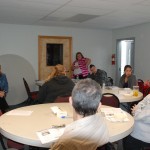
Article and photo by Jeannie Briones
TULALIP, Washington – “Stewards of Children is an evidence-based program targeting adults to help give them tools to protect children from sexual abuse. It’s the only evidence-based program in the nation, which means its gone under a lot of research, over many years and has shown to be effective in preventing child sexual abuse,” said Leila K. Goldsmith, J.D., Child Advocacy Coordinator for Tulalip Legacy of Healing Children’s Advocacy Center.
The Stewards of Children, a new program available at Tulalip Legacy of Healing Children’s Advocacy Center, is designed to educate adults about sexual abuse, how to look for signs that your child may be targeted or a victim, and how to prevent it in children.
“I’m excited about giving community members and service providers’ tools to protect children,” explained Leila. “It’s meant to help to empower adults to know what actions they can take to protect children.”
Nearly 70 percent of all reported sexual assaults occur to children ages 17 and under. The lack of education and information puts these children at risk.
Programs like Stewards of Children equip participants with simple proactive steps in protecting children from sexual abuse. This effective program helps adults see signs beforehand and prevent abuse from happening, so children can live a happy life, a world free from fear and shame. Sexually abused children blame themselves and live in a world of secrecy. Without proper help these children are at much higher risk for future problems with violent crime, have higher rates of teen pregnancy, and are at much higher risk of substance abuse.
Adults participating in the Stewards of Children training program are introduced to concepts of consciousness, choice, personal power, and relentless compassion. These four tools become a part of their personal tool kit for protecting children.
The Stewards of Children program is offered to community members who are interested in protecting children in their community. Next training will be offered on November 30th, 12:00 noon – 2:30 p.m. at the Tulalip Legacy of Healing Children’s Advocacy Center conference room. Light refreshments will be served and please respect that the location of the training is considered a safe zone.
One-on-one training is also available by request. For appointments, information on future training or information about the program, contact Leila K. Goldsmith at the Tulalip Legacy of Healing Children’s Advocacy Centerat 360-716-4100. To report child abuse call 1-866-363-4276 or contact the care crisis line at 1-800-584-3578 if you need to talk to someone for help 24 hours a day, seven days a week.
Jeannie Briones: 360-716-4188; jbriones@tulaliptribes-nsn.gov